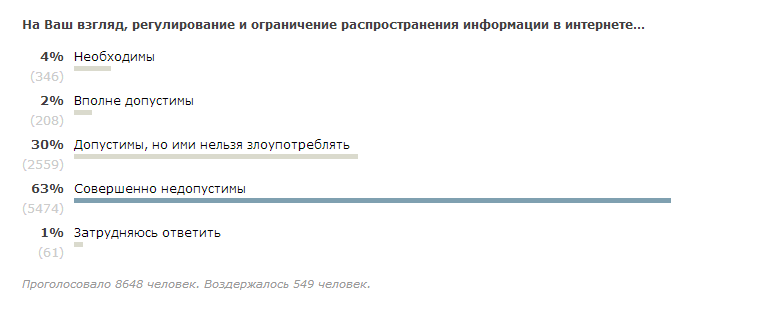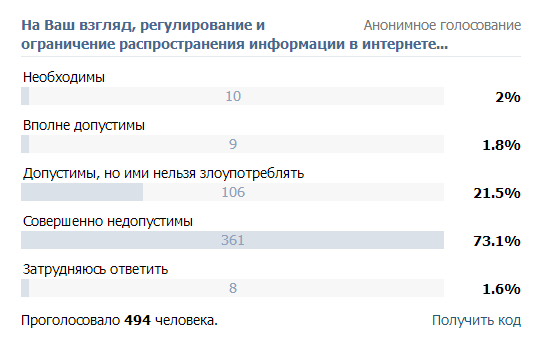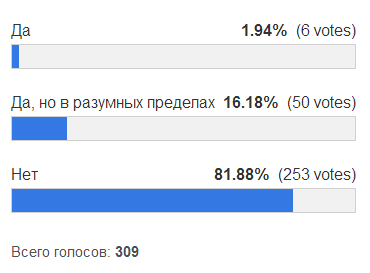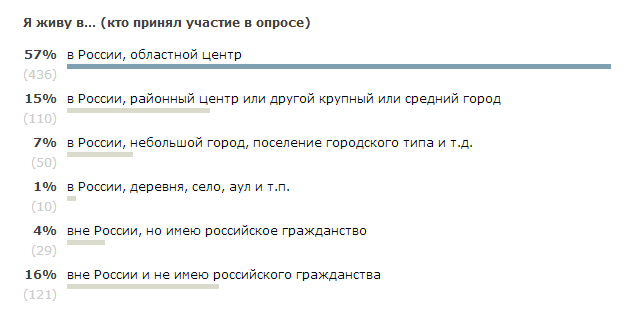The answer to the Internet community "Levade": only 4% of respondents consider it necessary to limit the web

Earlier, I published the post "Levada": only 5% of citizens of the Russian Federation consider restricting information on the Internet unacceptable. Our alternative survey. " Currently, I am presenting the results obtained during the study of the Habra community’s opinion on the stated problem and summarizing them.
But first, a small excursion - why I decided to conduct a similar alternative survey.
On May 12, a press release from the Levada Center regarding the results of the survey on the topic “Restrictions on the Internet” obtained by them was widely distributed among the media.
')
Most of the online publications on this occasion were full of headlines: “ Internet regulation has more supporters than opponents ”, “Russians are not against Internet censorship”, “Internet regulation is considered unacceptable only by 5% of Russians”, “Russians do not need freedom on the Internet” etc.
Later, the detailed results of the survey "Levada" posted on its portal .
To put it mildly, the data presented by the analytical center alerted me, really, really, freedom and access to information on the Internet without restrictions imposed on top is needed only for 5% of Internet users?
Having studied the numbers, I was surprised by a number of points.
For example, what was asked "for the Internet" and those who had never heard of it and did not use it. Or, for example, that about the law on bloggers, which is discussed in the survey among those who do not use the Internet, does not know 90% of the respondents, and at the same time they are further asked about their attitude to this law!
Were puzzled and obscurantist figures, results, especially the fact that only 5% of respondents (of those who use the Internet) and 3% of those who do not use the restrictions on the Internet, according to the Levada poll, were completely unacceptable.
In a word, all this prompted the idea to organize an alternative survey on the same issues, but directly in the Internet environment.
No, I was not going to make an absolute relevant sample for all sections of the Russian population, but I had the idea to show that we should not replace concepts and speak for the Internet community with the opaque presented survey results - it can speak for itself and more definitely!
First, a survey was organized within the group " RosKomSvoboda " on the social network VKontakte, so to say, initially to study the opinion of the target audience, here are the survey results:

( link to survey )
Further, similar surveys were studied that were conducted at the same time on the Web, here are a couple of examples:
Hopes & Fears: Is it necessary to regulate the dissemination of information on the web?

( link to survey )
Computer Bild: Do you support the law on bloggers?

( link to survey )
According to all the data of surveys conducted by different sources with different audiences, the results are quite similar and predictable - the vast majority of respondents everywhere oppose new laws to restrict access to information.
But it was decided to make an even more accurate sample with more qualitative and quantitative indicators.
I think Habrahabr is quite suitable for this role as the largest community of IT specialists and representatives of related specialties in Runet (programmers, designers, analysts, journalists, copywriters, representatives of telecom operators, registrars, hosting companies and other specialties in the Internet sphere) .
Habrahabr is also one of the largest communities of the entire Runet, with an average daily attendance of about 1 million people.
But let us recall the survey sampling rates from Levada:
The survey was conducted on April 25-28, 2014 for a representative all-Russian sample of urban and rural population among 1602 people aged 18 years and older in 130 settlements of 45 regions of the country. Distribution of answers is given as a percentage of the total number of respondents, together with data from previous surveys. The statistical error of these studies does not exceed 3.4%
For a number of parameters, our survey turned out to be even deeper:
The survey was conducted from 12 to 18 May.
Age: from 17 years and older.
The survey involved 8648 people.
From 43 regions of Russia.
Voices are still accepted, but the overwhelming majority responded in the first days of the survey.
The questions for our alternative survey and the answers to them are identical to those formulated by Levada, so that direct correlations between these surveys can be made and compared with each other.
4680 people from among the respondents indicated their age:

Well, directly the results of the survey:

The question about the distribution of votes by population of the respondent’s residence was added later to the questionnaire and was optional and optional - therefore only 756 people answered it, and it can be ignored, but we’ll also give it for reference:

What we see from the presented results: 63% of respondents consider restrictions in the Internet environment to be completely unacceptable, and only 4% - those who believe that they are necessary.
The data we have collected is diametrically opposed to the data of “Levada”, while they are no less legitimate for Internet users.
On the Levada website itself, users expressed the opinion that the data presented turned out to be very ambiguous - this is the opinion of those who studied the poll and participated in the voting on its results on the Levada website itself:
About 80% of respondents indicated the controversy of the data presented by the analytical center.
I do not want to say that the figures obtained as a result of our research are the ultimate truth.
But analytical centers need to approach more deeply the conduct of such surveys and not substitute the opinions of Internet users with their results.
Subjects of the Russian Federation, of which respondents took part in the survey (according to information from those who clearly indicated their region of residence):
Moscow region
Novosibirsk region
Khabarovsk region
Nizhny Novgorod Region
Moscow
Komi Republic
St. Petersburg
Volgograd region
Saratov region
Astrakhan region
Arkhangelsk region
Tomsk region
Sverdlovsk region
Voronezh region
Chelyabinsk region
Vologodskaya Oblast
Rostov region
Tula region
Samara Region
Kaluga region
Tyumen region
Republic of Tatarstan
Perm region
Stavropol region
Ulyanovsk region
Ivanovo region
Krasnodar region
Republic of Bashkortostan
Sevastopol
Novgorod region
KMAO-Ugra
Republic of Crimea
Vladimir region
Kurgan region
Chita region
Primorsky Krai
Irkutsk region
Kirov region
Lipetsk region
Altai region
Omsk region
Penza region
Kabardino-Balkar Republic
Novosibirsk region
Khabarovsk region
Nizhny Novgorod Region
Moscow
Komi Republic
St. Petersburg
Volgograd region
Saratov region
Astrakhan region
Arkhangelsk region
Tomsk region
Sverdlovsk region
Voronezh region
Chelyabinsk region
Vologodskaya Oblast
Rostov region
Tula region
Samara Region
Kaluga region
Tyumen region
Republic of Tatarstan
Perm region
Stavropol region
Ulyanovsk region
Ivanovo region
Krasnodar region
Republic of Bashkortostan
Sevastopol
Novgorod region
KMAO-Ugra
Republic of Crimea
Vladimir region
Kurgan region
Chita region
Primorsky Krai
Irkutsk region
Kirov region
Lipetsk region
Altai region
Omsk region
Penza region
Kabardino-Balkar Republic
Source: https://habr.com/ru/post/223737/
All Articles